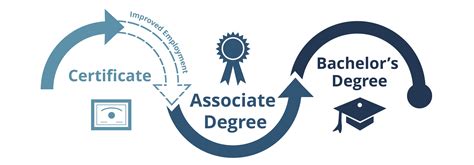Are you an associate’s degree holder looking to advance your career? Do you aspire to earn a bachelor’s degree but are unsure how to proceed? This article will guide you through the intricacies of the associate to bachelor’s degree pathway, providing valuable information to help you make informed decisions and achieve your academic goals.

Why Pursue an Associate to Bachelor’s Degree?
Enhanced Earning Potential: According to the U.S. Bureau of Labor Statistics, individuals with a bachelor’s degree earn significantly more than those with only an associate’s degree. On average, bachelor’s degree holders earn 67% more per week than associate’s degree holders.
Career Advancement: A bachelor’s degree is often required for managerial and leadership positions. By completing a bachelor’s degree, you expand your career options and open up doors to higher-level responsibilities.
Knowledge and Skill Acquisition: Bachelor’s programs offer a comprehensive education that deepens your knowledge and develops critical thinking, analytical, and problem-solving skills. These skills are essential for success in today’s competitive job market.
Choosing the Right Program
When selecting an associate to bachelor’s program, consider the following factors:
Program Structure: Look for programs that offer clear pathways and articulation agreements with bachelor’s degree-granting institutions. Ensure that the program’s curriculum aligns with your career goals and interests.
Transferability of Credits: Determine the number of credits that will transfer from your associate’s degree to the bachelor’s program. This will help you minimize the time and cost of completing your degree.
Coursework Alignment: Evaluate the coursework required for the bachelor’s program and ensure that it builds upon the foundation you have established in your associate’s degree program.
Admissions Process
The admissions process for associate to bachelor’s programs may vary between institutions. However, most programs require the following:
Official Transcripts: Submit transcripts from all institutions attended, including your associate’s degree.
GPA Requirement: Meet the minimum GPA requirement set by the bachelor’s degree-granting institution.
Application Essay: Write an application essay that highlights your motivation for pursuing a bachelor’s degree and describes your relevant experiences and qualifications.
Financing Your Degree
Various financial aid options are available for students pursuing an associate to bachelor’s degree, including:
Federal Financial Aid: Apply for federal grants, loans, and work-study programs.
State Grants and Scholarships: Explore state-level financial aid programs that may offer assistance to students pursuing higher education.
Institutional Scholarships: Contact the bachelor’s degree-granting institution to inquire about scholarship opportunities available to transfer students.
Tips and Tricks
Plan Ahead: Begin researching your options and applying to programs early to ensure a smooth transition.
Maximize Transfer Credits: Carefully select your associate’s degree coursework to maximize the number of credits that will transfer to your bachelor’s program.
Network with Advisors: Connect with advisors from both your associate’s degree institution and the bachelor’s degree-granting institution to stay informed about program requirements and transition support services.
Common Mistakes to Avoid
Lack of Research: Not adequately researching program options and admissions requirements can lead to delays and setbacks.
Poor Course Selection: Choosing courses that do not align with the curriculum of your bachelor’s program can result in wasted time and money.
Insufficient Preparation: Failing to prepare for the admissions process can jeopardize your chances of acceptance.
Conclusion
The associate to bachelor’s degree pathway offers a valuable opportunity to advance your career and achieve your educational goals. By carefully considering your options, following the steps outlined in this article, and avoiding common pitfalls, you can strategically navigate this path and achieve success. Remember, the journey to a bachelor’s degree is an investment in your future, empowering you with the knowledge and skills to excel in your chosen field.
Table 1: Earnings Difference by Education Level
| Education Level | Median Weekly Earnings |
|---|---|
| Associate’s Degree | $770 |
| Bachelor’s Degree | $1,280 |
Table 2: Average Cost of Tuition and Fees
| Institution Type | Tuition and Fees |
|---|---|
| Public 2-Year College | $3,770 |
| Public 4-Year College | $9,410 |
| Private Non-Profit 4-Year College | $32,410 |
Table 3: Common Mistakes to Avoid in the Associate to Bachelor’s Degree Pathway
| Mistake | Impact |
|---|---|
| Lack of Research | Delays and setbacks in transitioning to a bachelor’s program |
| Poor Course Selection | Wasted time and money on courses that do not transfer |
| Insufficient Preparation | Jeopardized chances of acceptance to a bachelor’s program |
Table 4: Questions to Ask Yourself
| Question | Purpose |
|---|---|
| What are my career goals and aspirations? | Determine if a bachelor’s degree is necessary |
| What are the admission requirements for the bachelor’s programs I am interested in? | Ensure I meet the eligibility criteria |
| How can I finance my education? | Explore financial aid options to cover the cost of tuition |
| What is the time commitment required to complete a bachelor’s degree? | Plan my schedule and make necessary adjustments |
